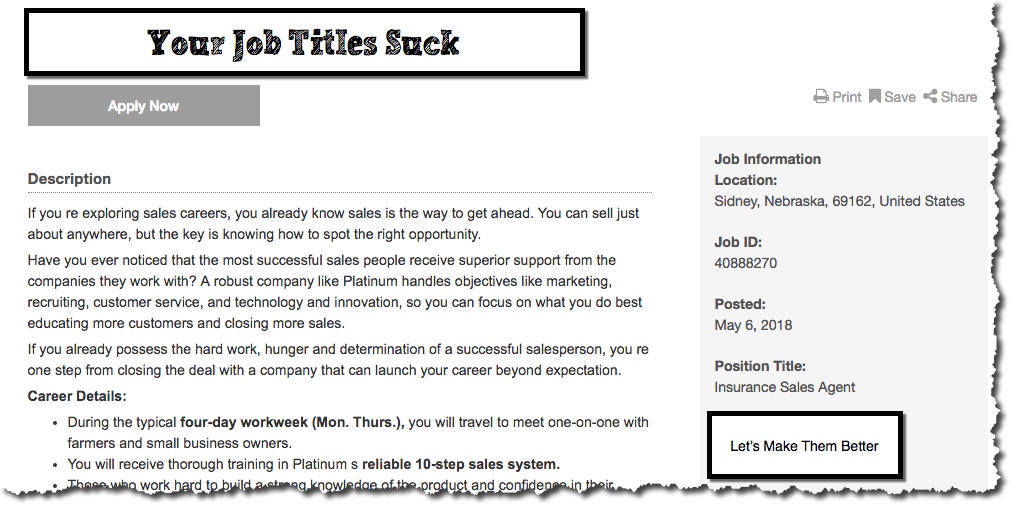eQuest, the Internet’s largest job posting distributor that gathers job board performance records by the billions, recently released a study of more than one million job postings advertised globally over the past 12 months to determine which part of the job posting attracts candidates more than others.

eQuest performed research on the response trends of candidate data, including the jobs to which they did or did not respond. Job titles, with “location” a close second, are now paramount to the success of recruitment marketing strategies, seeker engagement, and return on investment more than anything else.
The study found that misaligned and incorrect job titles from HR can have a significant negative impact on job posting performance and, ultimately, the overall business of recruitment.
Factors contributing to job titles that resulted in a lower response rates include:
- Too confusing — Whether vague (e.g. “Support Specialist”) or complex (e.g. “Multichannel Transmission System Operator), candidates did not readily apply to indiscernible job titles.
- Too cute — “Ninja” or “Rock Star” as the sole job title, or part of it, resulted in low performance.
- Too long — Data on excessively long job titles (e.g. “Python, Backend, Kafka, Cassandra, Thrift Developer”) received significantly less apply clicks.
- Too technical/Unknown — A “Senior Technical Analyst III/DB5.X17” can mean a number of things or literally nothing to a candidate. Many companies pass through the hidden or company-version of a job title. Results? Dismal.
- Too wrong — Misspellings, incorrect grammar, typos, and the like can be show-stoppers. It must have been somewhat embarrassing for the company that released the job title: “Director of Pubic Works.”
A Closer Look at Job Title Function and Impact
Creating job title relevancy is the single-biggest determining factor for ensuring job postings are visible to job seekers, thus leading to more and better applicants. In addition to how long a job post has been on the site, most job boards use keyword and geographic matching to generate job search results.
While search engines have become smarter in making correlations between a user’s search and job postings — for example, an inquiry for “RN” will likely return results for “Registered Nurse” — employers should not leave it solely to the algorithms and be more explicit in their job titles.
An Example: “Account Manager” vs. “Acct Mgr”
The data confirms that job board search algorithms struggle with deciphering “Acct Mgr” correctly. Compared to the “Account Manager” title, posts with the “Acct Mgr” title generated 81% less views and 90% less applications/resumes per post.
Assuming an industry-standard 20% view-to-application conversion, 10,000 views for an “Account Manager” post would result in 2,000 applicants. In contrast, the “Acct Mgr” post generated 200. Furthermore, 40% of the “Acct Mgr” posts didn’t receive a single view, compared to only 15% for “Account Manager” posts.
In context of money spent for job advertising, if 1,000 posts were purchased at $150.00 each (or $150,000.00), $60,000.00 of that would have been spent unnecessarily – with zero return on investment.
A Few Other Data Points
- “Admin Asst” generated 20% less views and 36% less applications/resumes per post compared to “Administrative Assistant.”
- “RM” generated 75% less views and 97% less applications/resumes per post compared to “Recruiting Manager” and “Recruiter.”
Recommendations
Avoid abbreviated titles, which have the biggest challenge in terms of keyword correlation. Job post performance suffers due to lack of relevancy, as most seekers don’t search using abbreviations.
Understand what keywords are driving the highest-performing posts and incorporate those into your job titles. This has a significant impact on post relevancy and, ultimately, application and hiring performance.
Benefits of Good Job Titles
- Better impressions — Before a candidate even clicks, they need to see your job posting. A strong job title will help increase your visibility in search results.
- Better clicks — Grabbing the candidates’ attention with your job titles is a huge step toward them taking action. The likelihood they’ll click on your post increases, as a result.
- Better hires — Properly aligning and publishing your job titles attracts more qualified candidates and stronger talent. In turn, it boosts the chance they’ll apply and join your company.
- Better efficiency — Crafting consistently good job titles streamlines the overall recruiting and job posting process. Following best practices also makes recruiters’ job easier, and who doesn’t want that?
- Better brand awareness — Candidates’ positive experience with your job titles is an extension of your brand. They’ll tell their friends and colleagues, so you want to be at your best.
Closing
The goal of job titles is not simply to inform, but to create greater visibility among seekers by using appropriate and highly searched keywords. Reducing abbreviations and publishing more industry-standard, clear job titles — oh, and proofreading — are relatively simple steps help ensure your posts are performing better (e.g. more views, more applications) and increasing your return on investment.
